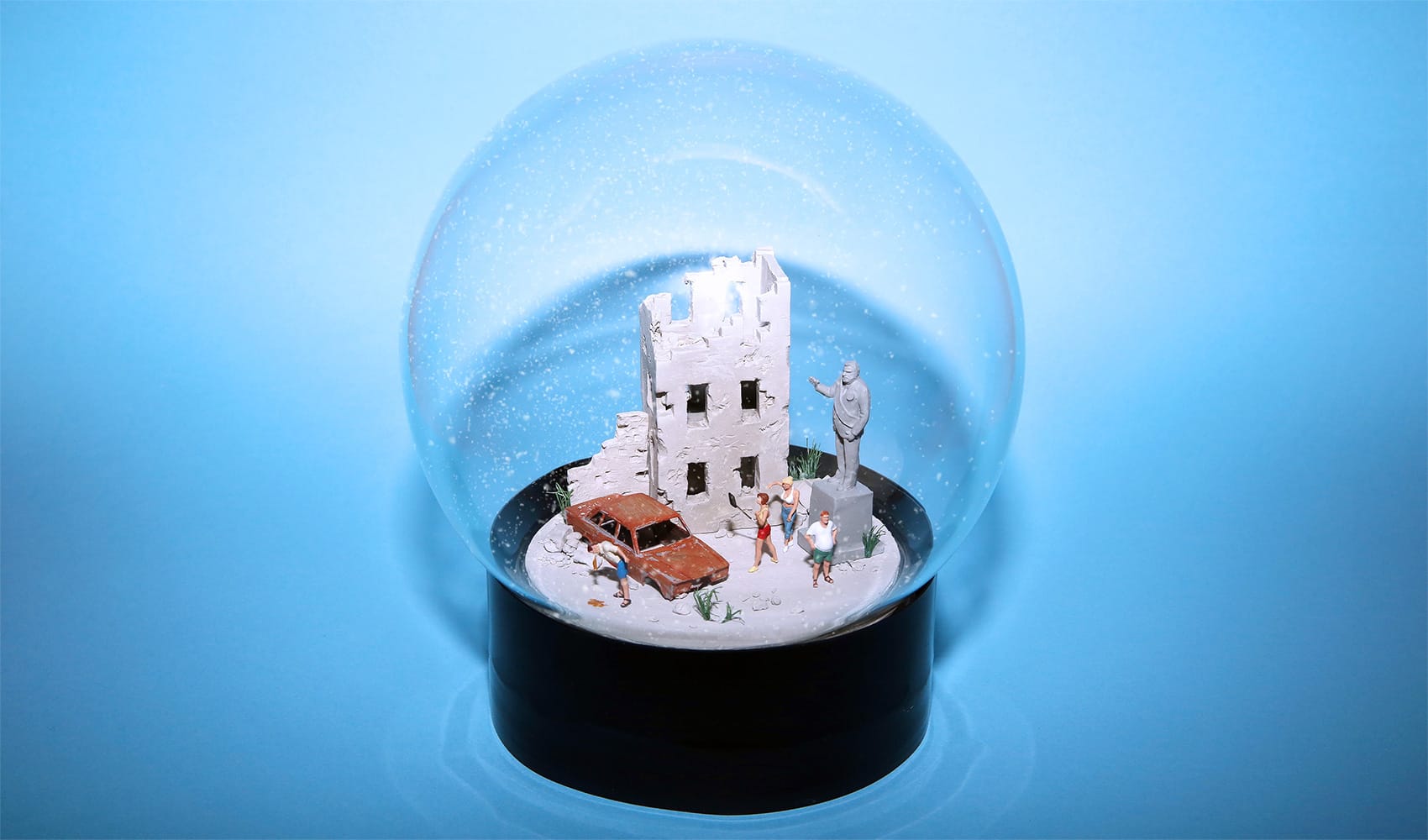
“I beg that you see how I am only human,” Otto Warmbier pleaded tearfully at his February 2016 show trial in Pyongyang. The University of Virginia honor student sat in judgment beneath gold-framed portraits of the Kim family, tugging occasionally at the fratty summer jacket he wore over his parti-colored shirt. Before him: a scrum of cameras and a horseshoe of dour goons scribbling in notebooks. The courtroom itself—its dimensions were simply wrong. Too tall, too narrow, why’s there a fern in the corner. Dreamlike, in the eeriest way.
“I have made the worst mistake of my life,” Otto admitted. Two months earlier, he’d ventured into North Korea as part of a five-day package with a China-based outfit called Young Pioneer Tours. He and some other Westerners did what was apparently common on these trips: They imbibed a few cocktails, they snapped a few outré photos in front of statues of mass murderers. As they were boarding their plane out of the country, however, Otto was quietly apprehended. He was accused of committing “a hostile act against the state.” Eventually, Otto was arraigned on charges of working secretly for the U.S. government and attempting to “[bring] down the foundation of [North Korea’s] single-minded unity.” How he supposedly went about this was by stealing a propaganda poster from a forbidden floor of the hotel where his group was staying. For evidence, the North Korean government provided ostensible surveillance footage showing ... a silhouetted humanoid ... lifting up a sign? And leaning it against a wall?
Along with countless others, I watched on television as Otto raised a prayer to the courtroom ceiling. I watched him collapse headfirst toward the microphone, as if the molten despair spilling through his mind had hardened, and set. I watched his body rack with sobs.
The North Koreans sentenced Otto to 15 years of hard labor. Seventeen months later, he was returned suddenly to the United States. Photos showed him being carried off a plane, limp as an exhausted child, colorless as a ghost, with tubes curling into his nose. Soon it was revealed that Otto was in a persistent vegetative state. He died after a few days at home.
Our commander in chief responded by accusing the North Koreans of torturing Otto “beyond belief.” A member of their foreign ministry rebutted by calling Donald Trump an “old lunatic.” The executive branch would eventually return the DPRK to the list of state terror sponsors, and Congress banned all Americans from traveling there. One of the world’s most fraught relationships deteriorated further—to the point where our president has taken to trolling North Korea’s ICBM-possessing dictator by referring to him as “Little Rocket Man” and cracking erectile dysfunction jokes. Meanwhile, the North Koreans have tested more missiles. Slowly, steadily, the specter of thermonuclear flame war has risen higher across our horizon, thanks in part to our modern Archbro Ferdinand who maybe ganked a poster while out on tour with an obscure travel group.
It was that obscure travel group Otto’s father lit into during a press conference following his son’s return. While dressed in the same ecru blazer Otto wore during his trial, Fred Warmbier denounced Young Pioneer Tours for turning his son into “fodder” for the isolated regime. “They lure Americans, then they take them hostage, then they do things to them, and that’s what happened to my son,” he said, conflating the Young Pioneers with the North Korean government.
Admittedly, YPT was doing a less than stellar job of convincing people that it was not, say, a malign backpacking cult. In the wake of Otto’s death, the group scrubbed any mention of him from its various accounts, aside from a Facebook note stating that “we too are reeling with the shock of a young man's life taken well before his time.” YPT discreetly amended the “North Korea FAQ” section of its website. No longer was the question “How safe is it?” followed by the answer: “Extremely safe! Despite what you may hear, North Korea is probably one of the safest places on Earth to visit.” Now, YPT acknowledged: “Despite what you may hear, for most nationalities, North Korea is probably one of the safest places on Earth to visit provided you follow the laws as provided by our documentation and pre-tour briefings.”
Inelegant, to say the least. But as I dug deeper into the company, I learned that inelegance was YPT’s stock in trade. Its promotional materials read like Ryanair in-flight magazine columns penned by laddish blokes who would absolutely follow through on a dare to thud-shut an unabridged dictionary on one or another’s testicles. “I’m sure we’ve all daydreamed about owning a time machine,” began a blog entry written after Otto’s apprehension. One essential journey would be to the year 3000 to see “just how fine your great-great-great-granddaughter really is.” After that, “my itinerary consists of those strange turning points in history ... Think the dying days of the Roman Empire, a time when the art of hosting orgies reached its throbbing, writhing zenith. Or Germany’s Weimar years, when ‘degenerates’ of all stripes drank and sang in the Berlin cabarets as Hitler’s brownshirts marched outside.”

 Left: Otto Warmbier bows before the North Koreans at his show trial in Pyongyang. REUTERS/KCNA
Right: “#monday” read the caption for this now-deleted Instagram picture of Gareth Johnson.
Left: Otto Warmbier bows before the North Koreans at his show trial in Pyongyang. REUTERS/KCNA
Right: “#monday” read the caption for this now-deleted Instagram picture of Gareth Johnson.
Many of these posts were written by YPT founder and “semi-mythical travel creature” (their words) Gareth Johnson, a 37-year-old Brit. Gareth’s worldly experience began when he went for a dip in raging Bengali floodwaters at age 16. From there, he became a cruise-ship bartender, an English instructor and a foolhardy entrepreneur who has started several companies beyond YPT. One was a Philippines-based stag party service called Gross Negligence Travel that promised “beaches, babes, bullets and booze (all cheap).”
Legion are the stories of a drunk Gareth falling out of a moving train and breaking his ankle, or passing out on the floor at a homestay with his member a-dangle from his shorts, or attempting to cross the border from the DPRK into China while “almost unable to stand and barely understandable when he did speak,” as one client put it. In the aftermath of Otto’s detention, Gareth told Reuters he was going to remain in North Korea “to try and work out what the situation was.” Less than two weeks later, though, Gareth posted a photo to Instagram showing him snuggled up to a bottle of clear liquor, pouting. One week after that, Gareth posted another photo to Instagram showing a customer standing amid a wintertime train station, pantsless. Hashtag: NorthKorea.
When the Daily Mail ran a story last June under the headline “The ‘Grossly Negligent’ Brit who sent student to his doom in North Korea,” Gareth wiped himself from social media. He declined interviews. Stopped answering his phone. He really did transform into a semi-mythical travel creature.[1] 1. When I asked YPT if Gareth was still involved with the company, a spokesman replied, “Gareth received your emails to his personal account.” So.
The negative press coverage, the group’s own tone-deaf communiques, motherloving Gareth—all of it pointed to YPT being a clutch of maladaptive nihilists who made good money escorting louche tools to the most politically and culturally sensitive locations on the planet. Even their name was off-putting. The Young Pioneers had been the Communists’ child indoctrination wing, something like the Boy Scouts (or Hitler Youth) for would-be apparatchiks. Yet somehow, this shoestring-budgeted company promising “to take you safely and cheaply through any place on the planet that your mother would like you to stay away from!” had earned a perfect 5.0 score on TripAdvisor.
Which is to say that somewhere along the line there, I signed up for YPT’s inaugural Caucasus Combo tour. I don’t know—it was late at night, and I was in deep. This two-week, $2,540 trip was part of a larger Summer Soviet package that would begin in Chernobyl, stop in Moscow (where I’d join up), ramble through the Chechen Republic and then drop into the diplomatically unrecognized Republic of South Ossetia. Come mid-August, the Young Pioneers would be the first group of international yahoos to have toured the latter two republics. Assuming everything went according to plan, of course.
And what a plan it was. Eight days after Otto’s death, my putative guide Shane, an Irishman one year my senior, was responding to my visa-application queries with answers like “You can use fake hotels” and “Handle that independently.” He enjoined me to present the Russian embassy with a bogus itinerary centered around bus tours in Estonia. At no point during this process was any peep made as to the State Department’s warning:[2] 2. Emphasis Foggy Bottom’s. “Do not travel to Chechnya or any other areas in the North Caucasus region. If you reside in these areas depart immediately.” As for the South Caucasus, well: “U.S. Embassy personnel are restricted from travel to Abkhazia or South Ossetia, even in the case of emergencies involving U.S. citizens … There are no commercial airports in either region making air ambulance evacuations impossible during medical emergencies.”
In other words, it was profoundly stupid—nay, monumentally irresponsible—for an American to go traipsing along these geopolitical fault lines. I knew this journey was selfish to the point where I could very well affect international relations. That I could be justly portrayed on TV as one more callous and/or terminally privileged dingus who had viewed the prospect of his death as a feature and not a bug. I knew this—as I suppose Otto knew, on some level, the risks that went along with his own YPT trip.
Yet the moment my plane swayed gently into its runup to liftoff, I felt the purest of pre-journey elation. As the YPT literature in my hand suggested, “It does not get much more adventurous and off the beaten path than this.”


I was no stranger to Moscow, having studied at the Russian State University for the Humanities in 2006. Russian language—along with literature and history—was one of my majors in college (owing to a beloved Soviet-fleeing grandfather). The other major was journalism (owing to no rational thought process I can recall). I used to have a readymade joke about how my education prepared me for a career in the thrilling field of 1933, ha-ha, until recent history made that joke not funny.
What a lot of people don’t know is that Moscow (including its surrounding administrative oblast) is the largest metropolitan area in Europe. About 16 million people live here, in their cars on the roads mostly, at every hour of the day and night. My taxi floundered through this traffic for the hour and 45 minutes it took to reach the hotel YPT had booked on the fringe of the city center.
Moscow is a world capital, surely, but to me that morning she was still redolent of darker times. Each flash of venal-oligarch chic was offset by rows of crumbling, rectilinear housing blocks. Low unbroken clouds like synthetic stuffing seemed to aggravate the dinge. The monumentalist scale of Stalin’s high-rises and the vast central avenues called to mind the longed-for New Masses who never quite showed up. The actual Muscovites seemed very busy, though maybe not exactly working.

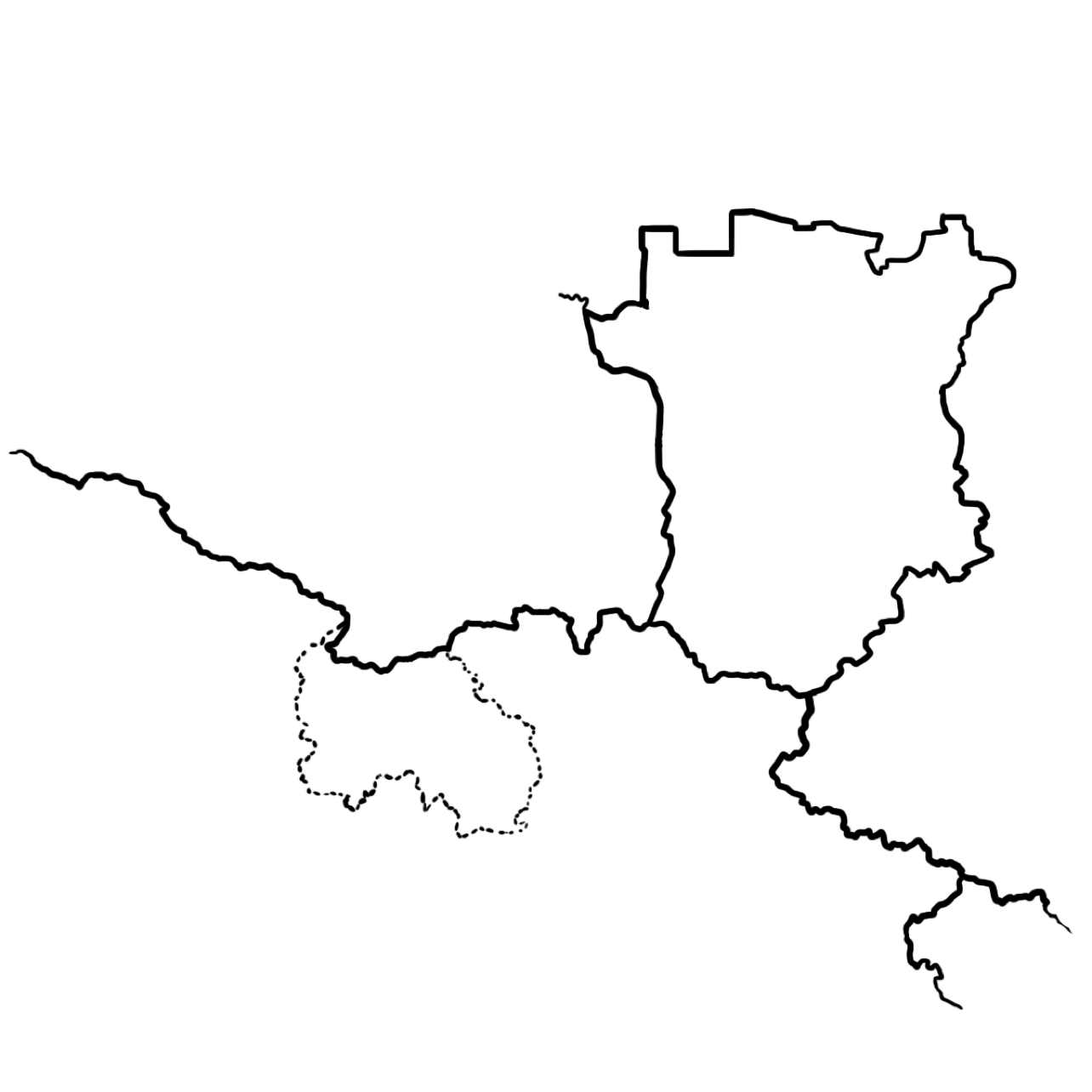
There’s a good deal of French hiding behind Cyrillic, yet the script itself lends Moscow the appearance of a truly foreign place. Like Arabic or Hindi, except slightly more familiar, more comfortable, because the English-speaking First Worlder can kinda-sorta see the linguistics peering around those hyperextended яs and spread-eagled жs. Many Russians have retained the Nordic features of their first Viking rulers, which also helps quell a white Westerner’s fear of the unknown. Nevertheless, most Russians older than, oh, age 30 still interact with unfamiliars according to the survival programming learned under Communism: Deny, dissemble, mock on the sly. All told, Moscow is that rare European metropolis different enough to make a traveler feel like a stranger.
And that’s what impels so much of travel, isn’t it? The quest after ever more novel, ever more unsettling places? Sailors, pith-helmeted Victorians and foreign correspondents used to be the only ones who could honestly call themselves world travelers. Now, though, much of the developed and developing world crisscrosses our globe as if searching after something.[3] 3. In 2012, the United Nations celebrated the milestone of 1 billion international trips taken in a single year. This was a milestone, yes, but one that was in line with the 25 million international trips taken in 1960, and the 250 million taken in 1970, and the 536 million taken in 1995. So many people travel now, and the business of travel has become so intertwined with national economies, that a country like Thailand can be the world’s biggest exporter of rice while still relying on tourism to be its biggest earner. What we’re searching after, professor Dean MacCannell tells us in his seminal works The Tourist: A New Theory of the Leisure Class and The Ethics of Sightseeing, is not necessarily luxury or R&R but difference. Difference that might change us. We’re looking to experience something so transformative that we just might return home an improved version of who we were when we left.
Once upon a time, there was a word for this kind of searching: pilgrimage. Religious travel used to ease this yearning for personal renewal. (It also begat the first touristic infrastructure, requiring things like inns and guidebooks—but I digress.) Today, the task of wholly-other discovery by way of wayfaring falls mainly to tourism.
One might call this a symptom of existential modernity. That is, a “modern” person is often a traveler because that person (consciously or no) feels rootless or spiritually homeless and believes real reality and genuine living are to be found elsewhere. In the past, perhaps, or in more “primitive” cultures or “purer” lifestyles. Anywhere, really, but where that modern person happens to find herself most days.
The hitch is that with ever more people seeking these authentic experiences, authenticity becomes that much harder to experience. Masses of travelers tend to leave in their wake the same hotels, souvenir shops, fast-food joints, Zaras, H&Ms and Starbucks—the “small monotonous world that everywhere shows us our own image,” as the tourism scholars Louis Turner and John Ash put it. Our relentless drive to ferret out and consume difference is causing us to erase it.
Into this scarcity step Young Pioneer Tours and rivals like Wild Frontiers, Untamed Borders and War Zone Tours. They truck in a type of traveling—to war zones, political hot spots, “dodgy” locales—that is known as “adventure” tourism (or “dark” tourism, which, more on that later). It’s a surprisingly vibrant market, one that grew by about 65 percent annually between 2008 and 2012 (the last year data was available) to a value of $263 billion. A lot of that growth is generated by your more stereotypically “adventurous” activities like whitewater rafting and bungee jumping. But a good chunk of it is driven by people who want to go where Anthony Bourdain or Vice News go.
Come, the subliminal pitch tells us, discover locales that have managed to avoid the infectious monoculture of the contemporary world. Never mind that, like explorers come bearing blankets, we can’t help but introduce pathogens we’ve long since grown inured to.
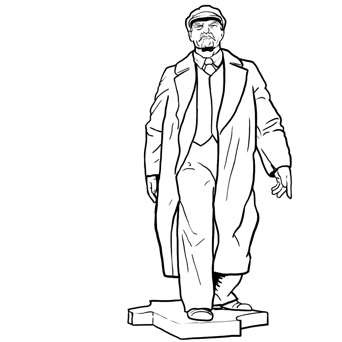
At the Muzeon Park of Arts, an open-air gallery of Soviet sculptures, I met the individuals with whom I’d be sharing the enforced companionship of the road. They hewed pretty closely to the demographic norm for these kinds of tours: eight professionals, all but one of them white Westerners, all but one of them older than my 31 years. The gender split was more equitable than usual, though, with four men and four women present. Each was a veteran YPTer, which was not surprising because in nine years’ time, the company has earned a huge repeat-customer business. Usually, people wet their feet in North Korea; then, like one of Otto Warmbier’s not-at-all-traumatized groupmates, they go on subsequent YPT trips to Cuba or Turkmenistan. In fact, almost every YPT guide has been drawn from its customer base—including one young Australian who climbed the ranks after his trip with Otto.
“Aye, we practically checked you out with the FBI. You came out of nowhere,” Shane said in his starchless Galway accent. “No Facebook presence, no connection with past customers, no DPRK.”
“And now you can never, ever go!” Matilda,[4] 4. Customers’ names and identifying details have been altered. a spritely Finnish doctor, added in French-perfumed English. Then she smiled. Matilda was never not smiling—smizing, really, with blue elliptic eyes.
Until Otto’s death, trips to North Korea had made up some 70 to 80 percent of YPT’s business. It’d been so ever since 2006, when Gareth claimed to have discovered a route into the Hermit Kingdom via Hong Kong that was cheaper than the one other tour companies were using. He tried it on his own, got shithoused with a North Korean official “in charge of stuff” and had such a good time that he decided he should guide others to their own good time in the DPRK. Now, YPT is the second-biggest player in North Korean tourism behind Koryo Tours, which offers pretty much the same itinerary but with a lesser chance of your getting “pranked” with the ol’ “can’t find your husband’s passport, sorry!” gag during the DPRK border crossing. (“Note,” this particular customer wrote, “YPT guide used to make fun of me during the tour in front of the group, which was absolutely fine with me, really! However, in this situation, it was not funny!”)
After spending a lean 45 minutes in Red Square, Shane directed our photo-snapping blob to a nearby outdoor café. “I haven’t had a beer in a long time,” he announced.
“How long?” I asked.
“Three days. That’s a long time in my line of work,” Shane said, and then cheers’ed the table when our pints arrived.
Shane was adequately stylish, clad always in faded black jeans + loud floral-print tee + white high-top Converse. On his right hand, he wore a traditional Claddagh ring in the position that indicated he was single and ready to mingle. He had a trickster’s smirking charisma about him. Handsome in a British Isles-y way—brown beard covering round cheeks, thinning hair swept back, brown eyes lively, smile fully pelleted with ovoid teeth.
His job, it appeared, was to act as the epoxy to group cohesion. This was his third year leading trips in Russia. He spoke not a word of the language save пиво—beer.



At the other end of our patio table sat Inna, a young, blonde Ukrainian who radiated modesty and concern. Inna was a former YPT intern who’d taken on an elevated role for this tour because she was the only one in the company who could speak Russian. Indispensable as she was, Inna’s relationship with Shane did not come across as equal. She was the one who’d reached out to the guides in Chechnya and South Ossetia; she had to act as the group’s menu translator and train-ticket buyer; she had to defer to Shane whenever questions arose, and stay awake while he disco-napped, and basically do everything while he concerned himself with morale. As we drank deeper, Inna walked off to “charge [her] phone.”
Across from me was Ruud, a hefty, bespectacled Bavarian who stood at least a full head taller than everyone else. Ruud seemed ashamed of his relatively limited English. That, or he was something of an eccentric, because rather than talk, he preferred to flip open his phone’s leather case and study digital maps whenever we sat down as a group. (He would, however, brighten considerably if anyone brought up world football. Ruud had an encyclopedic knowledge of match dates, locations and scores.) If we made toasts or attempted getting-to-know-you games, he would flatly state “I don’t play your games,” before returning to his phone.
Next to Ruud was George. At 59, George was our lone senior, a retired Barclays employee (bloody forced out amid the financial crisis, George admitted after a few pints) who carefully apportioned his pension for budget trips like this one. George was short, hunched, a mild stutterer. He wore khaki pants and narrow transition lenses. His upper and lower lips curled away from one another in diametrically opposed directions, providing him with a countenance as stunned-seeming as a clobbered cartoon duck’s. George had a rich, rolling laugh, and he brought it out at the slightest provocation. I could picture him jaywalking Magoo-ishly, going up and over a motorist’s hood, and then staggering to his feet with a ho-ho.
Matilda was planning to celebrate her 30th birthday by driving a Panzer tank over a family sedan “because I am Finnish, of course.”
Hearing George and Ruud discuss the wide-ranging YPT trips they’d been on, I felt something akin to inadequacy. I liked to think I was a pretty serious traveler myself. I’d been to strange places, done dumb things. I’d tracked down alleged witches in Papua New Guinea’s central highlands; I’d walked 1,000 miles across and down Florida’s peninsula. There was an ill-advised tattoo of St. Christopher, the patron saint of travelers, on my neck, even. But I was a goddamned amateur compared to these people.
“It’s a community,” insisted Gabriella, a blonde Austro-Australian luxury goods accountant. She was one half of a pair of women—opposite Chandra, a brunette Californian property manager—who had become fast friends on the Chernobyl leg of the Summer Soviet tour. Throughout the trip, these two stuck to each other as if Siamese twinned, whispergiggling in their private language. They would pretend to reveal things about themselves that (unbeknownst to others) were patently untrue, and then they’d laugh about it once we’d believed them. They often rolled their eyes at Matilda, or gossiped about her under their breath as she was speaking—like at this moment, for instance, when Matilda was bragging about how she would visit her 100th country well before her 30th birthday, which she planned to celebrate by driving a panzer tank over a family sedan “because I am Finnish, of course.”
“Even if you don’t know anyone on a trip,” Gabriella interjected, “you probably have four or five Facebook friends in common.”
“Like fookin’ Reinhart,” Shane offered. Everybody laughed but me and Jin, my roommate for the duration of the journey. Jin was a quiet, precise, stringily swimfit pathologist from Canada. When I asked him why he had chosen that field, he said, “My bedside manner is terrible, and I don’t like or understand people.” Jin classified his own need to see all of Russia as “pathological”—hence this trip.
After our fifth round, we decided it was time for dinner and more drinks. We were abuzz with anticipation, and also alcohol. None among us was married, or in a serious relationship, or outwardly amorous in virtually any sense. We were as unattached as tumbleweeds. We were also greatly inconveniencing our tomorrow, when the adventure began in earnest. But, what is an adventure except an inconvenience rightly considered? And, anyway, who goes on adventures nowadays, other than those in a position to take on inconvenience?


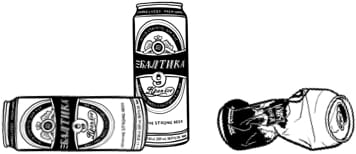
The next evening, we loaded up on beers in multiples of 12 and boarded our 36-hour train to Vladikavkaz, a city in the foothills of the Caucasus Mountains at Russia’s southwestern border. From there, we’d take a minibus into Chechnya, an Islamic ethnostate that has been in violent conflict with the motherland ever since the tsar first tried to subdue the mountains three centuries ago.
Chechnya hasn’t been much of a destination for Russians, foreigners—anyone—until, well, now. “You’re the guinea pigs!” as Shane had toasted. And for me, at least, this was an uneasy proposition.
During and after the two wars with Russia that followed the collapse of the Soviet Union, anywhere between 70,000 and 200,000 Chechen civilians (out of a population of about 800,000) were killed. What remains is a hard mountain people. Their national symbol is the wolf. Their image within the federation is that of school- and theater-bound hostage takers, bus and subway bombers. Even my two best friends, veterans of the U.S. wars in Iraq and Afghanistan, had warned me that the most fearsome mujahedeen they encountered were the Chechens—were by far the Chechens. Before I left, they sent links to the Chechen War execution videos we’d stumbled across as bored adolescents in the hairier days of file-sharing services. Boots on foreheads, cries for mama, serrated blades plunging into necks and then sawing…
On the train, we Young Pioneers peopled two sleeper compartments—four men in one, four women in another, Shane off by himself—and resumed where we’d left off. As our ponderous old carriage trundled past suburbs and then black forest, we powered on a Bluetooth speaker and took turns judging one another’s musical tastes. We played “Never have I ever.”
Shane surprised everyone by admitting that never had he ever pissed himself while drunk. We learned that Jin cooks chicken and vegetables for himself six nights a week (the seventh being reserved for date night with Mum). Ruud threw us a biographical bone: He’s an accountant specializing in agribusiness, and he walks to the office each morning at six because he likes to be alone for as long as possible. Matilda’s never touched a drop of booze in her life, owing to her incorrigibly alcoholic parents—though she does drink something like 14 Cokes while doing her rounds of internal medicine with the elderly. “They groan when they see me,” she said with a smile, “because I mean they are probably not long for this world!”
Eventually, the group broke off into what I discovered was their favorite—and, for all intents and purposes, only—topic of conversation: remote territories they’ve visited, visas they’ve accrued, who was beating whom in the race around the globe.
George: “I got a Nagorno-Karabakh visa when I went.”
Gabriella: “You’re so lucky! I was on a group visa, so…”
Matilda: “I had an Antarctica stamp, and then somebody stole my freaking passport! And it was almost full!”
Chorus: “Oooooh, that hurts. That hurts.”
It hurt in large part because Matilda, like many on the trip, structured her worklife around travel and not the other way around. To keep her options open, she only signed one-year contracts with hospitals. And to hear her tell it, she dreamed not one whit about a more rooted, domestic life. Which is something she shared with the rest of the group. If these YPTers had any concerns about home, or friends, or daily life in the abstract—they did not let on. They made a show of caring only about the road.
While the others continued their passport-measuring contest, I decided to pry. I asked Shane what, if anything, he did before YPT. Standard post-uni malaise, he said. A year working in insurance; a year doing more run-of-the-mill tourism in New Zealand and east Asia. He found out about YPT while browsing Reddit; their whole vibe seemed to square with his personality as well as his academic background, which had been rogue states.
He’s since become the manager for all non-Korea tours as well as an investor in the company, he added. And, as we both had some water in the basement at this point, I felt no compunction about asking, “You make good money?”
“Why’s it always a Yank who starts asking about salaries?” Shane said with a laugh. Eventually he conceded: “It doesn’t pay well, no. I don’t have health insurance. I’ve been living in the company flat ever since I broke up with my girlfriend. I don’t know how long I’d want to keep doing this, but I’m doing it now.” He punctuated this statement with a tip of his half-full can, which he then downed.
“Ach,” he said, twisting his head, narrowing his eyes, smacking his lips. “Nothing worse than a warm beer, hey?”

A large-bore sun burned through the cobwebs of my hangover soon after dawn. I slid from supine to seated on my cabin bench, where I squinted out the window at a Hanna-Barbera-esque repeating reel of softly undulating plain → birch forest → onion-domed church overlooking desolate burgh → softly undulating plain → birch forest → and so on.
Russia, in other words. Her rural areas, the little Tolstoyan villages—once considered the foundation of the country’s culture and identity—that have been dilapidated by recent history and socioeconomic trends. The number of deaths in Russia last year exceeded the number of births by several thousand. Her military strength is decaying, her economic dynamism is waning. Even in terms of geography, today’s Russia is the smallest Russia since 17th-century Russia. Her recent lashing out—it’s not exactly coming out of left field.
Soon, my bunkmates roused themselves and Shane joined us in the compartment. We cracked breakfast beers at 9 a.m., passing the time by quizzing Ruud on historic soccer matches. I’d forgotten to buy bottled water and did not have rubles in small-enough denominations for the dining car, so I made the regrettable (regrettable) decision to rehydrate by filling my thermos with bathroom-sink water.
Versts—they flew by. Platforms—we stopped at them. We purchased more flagons of beer and stumbled over railroad ties. Back on the train, a stranger approached. He sauntered down the corridor with a Yorkshire terrier clutched like a football under one arm, his linen shirt unbuttoned to the navel, his stout torso’s worth of symmetrical prison tattoos on full display. He filled our doorframe, petted his lapdog, and announced: “Здравствуйте! Меня зовут Серёжа! Я гангстер.”

“Ahh, err,” I translated. “Fellows, this is Seryozha. He says hello. Also, that he is a gangster.”
Seryozha simpered ironically, the way a wiseguy will when he knows he has a gun and you do not. He waved his free hand at George, who inched closer to Jin to make room on the bench. Seryozha tsk tsk’ed me for the Baltika 9 I was drinking, withdrew a Heineken from his left pants pocket and proceeded to hold court for the next ??? hours, lecturing me (and, through my spotty translation, the rest of the cabin) on topics such as: “Why I Stole Motorbikes”; “Prison Was Prison, and You Don’t Want to Know About Prison”; “Man, Did I Miss Cooze, Though”; and, lastly, “Magic.” Seryozha had so many prison card tricks he wished to perform, every single one of them inscrutable to us civilians. He’d say something I couldn’t translate, shuffle, bite his lip, flip down a random suit, and then look from face to face, awaiting our reaction.
“Express astonishment, you dipshits,” I hissed through a smile. “Jesus Christ!”
Jet lag, bender, the amniotic rock of a Soviet-era rail system—whatever it was, I began to lose my senses of temporality, corporeality. At a brief platform stop, I hopped off with Sergie, who bought us bottles of citrus vodka and Ukrainian cognac-substitute from a guy with a bag. By the time we returned to the cabin, it was just him, me, Shane and George. Seryozha toasted to romanticism, to romanticism not being dead, he had me clarify. I’m pretty sure he had us toast to strong borders, and lasting friendship between Putin and Trump, whom Sergie loved. We choked down the cognac. Shane and George left immediately thereafter, whinnying. Sergie brought out a satchel of pearly cold cuts and began to make sandwiches for the two of us. When I tried to tell him that he need not, he laughed softly and placed a finger to my lips.
This begged the eternal traveler’s question: What the fuck am I doing here?
I’d often thought that travel wasn’t travel until I encountered something I didn’t understand. That is to say: If I came across people or situations that were easy to read, I was probably reading my own character or experience or beliefs into those things. But if I found someone or something whose meaning remained dark to me? Well, that person or that thing might be what ultimately illuminates the place. Such was the paradox: I wanted to understand Russia, East Timor or wherever it was I happened to be. But the moment I did understand them, I worried, would be the moment I was no longer traveling.
Seryozha’s finger on my lips was as cold and dense as the head of a tack hammer. He looked deeply into my eyes, switched to a rapid-fire Russian I had no feel for (save the intermittent swearing), and laughed while slapping my cheek several times before halting his monologue with a sudden, serious: Don’t you agree?
Strange to think his Yorkie understood Russian better than I did. “Конечно да,” I said. Of course I do. We laughed into one another’s faces. We proposed more toasts over slimy sandwiches. I gulped bathroom water from my thermos the way a drowning man swallows the sea. Somewhere along the line there, my lights cut out.


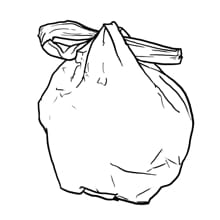
I awoke facedown on my bench. Shane stood over me, asserting, “Jesus, Mary and Joseph! It smells like absolute cow shite in here!” I let out a long groan; I felt as if I had been slowly, painfully teleported, my body and soul disintegrated and then reconstituted on the other side, except not all of me made the journey. I cracked an eye and saw that passengers were filing off with their luggage. We had reached Vladikavkaz. I pushed myself into a seated position. I immediately sank half an inch into warm loam.
“Everything all right?” my travelmates asked. I grabbed my duffel and shoved past them, agitating for the water closet in a lock-kneed spraddle-waddle. Once inside, I took a few minutes to peel my pasted jeans from my body. I tried stuffing the evidence into the overflowing toilet paper basket. (When did I eat chives? Why are the stalks unbroken??) Alas, this narrow-gauge receptacle was hopeless. Gabriella pounded on the door, shouted that she needed to go one last time, also we had a bus to catch.
I understood panic then. Panic is an emotional state in which what was once background noise suddenly overwhelms everything else in one’s head. Fortunately, Uniqlo had been running a sale on the jeans I prefer in the week before my departure, so I pulled an identical pair out of my duffel. I triple-wrapped the evidence in plastic bags, having no choice but to carry it with me until I could sneak off and dispose of it. I joined the others at the front of the train station.
The atmosphere of the North Caucasus was bright, cloudless and kiln-hot. Inna paced nervously, worried that our Chechen chaperones had blown us off, but soon a white minibus turned into the small parking lot. From it emerged our guide, Mohammed, and Mohammed’s translator, Mohammed.
Welcome! said our guide (dubbed “Mohammed #1” by the group) via translator (“Mohammed #2”). You are first group of internationals to tour Chechnya! he proclaimed.
Unlike virtually every other Chechen man I encountered, Mohammed #1 did not wear a beard. He had a gaunt, pallid face and deep-set blue eyes that often expressed impatience with his more conservative countrymen. Mohammed #2, on the other hand, was a lithe ex-kickboxer in his mid-20s, which put him maybe a decade younger than Mohammed #1. He sported the same forward-combed hair and trimmed beard as Chechnya’s beloved mountain enforcer of a president, Ramzan Kadyrov—and by all appearances, Mohammed #2 shared Ramzan’s outward approval of everything orthodox. This tour was a first for them, too. Usually, they made music videos for people.
We drove for 90 minutes through North Ossetia, Ingushetia and finally into Chechnya, stopping briefly at the outskirts of Grozny, the capital city, to allow soldiers in an armored personnel carrier to sweep for IEDs. On first glance, Grozny seemed slapdash and impermanent, like a temporary colony on a craggy desert planet. Freshly planted saplings, haphazard apartment complexes spaced widely apart, and every few miles or so, a gleaming roadside mosque or new minimall. Grozny has been 99 percent rebuilt, Mohammed #1 told us. Some say 97, but I say 99. There’s a Putin Avenue. Not even Moscow or St. Petersburg has a Putin Avenue.
This is because the Grozny that stands today would not exist without his money. Shortly after Akhmat-hadji Kadyrov, modern Chechnya’s answer to George Washington, was assassinated in 2004, power coalesced around his large adult son Ramzan, who has proved himself to be one of Putin’s most trusted strongmen. Ramzan’s loyalty is expensive, though. From 2008 to 2012, Moscow pledged $120 billion to Chechnya. The torrent has since dwindled, but federal subsidies still accounted for 81 percent of the republic’s budget in 2015. The deal is that Ramzan gets to do what he pleases with this money so long as his fiefdom remains pacified, and loyal to the Kremlin.
And what appears to please Kadyrov is: purging his republic of homosexuals; burning down the homes of suspected extremists; posting Instagram videos in which Putin critics are put in literal crosshairs; possibly-probably involving himself in the murders of human rights activists, opposition leaders and journalists like Anna Politkovskaya. Among other interests, of course. Ramzan is also a big fan of coercing divorced couples to get back together, as well as mixed martial arts.
Such is the Faustian irony at the heart of modern Chechnya. After 300 years of open rebellion, the mountain warriors were finally subdued by Russia—but in being subdued, they achieved more practical autonomy than they had known during the previous three centuries. The tragedy is that this autonomy happens to be directed by a tyrant as petulant and capricious as a spoiled child.
It was impossible to avoid the man our first day there. He loomed so large, psychically. We drove under many an arch that featured his sun-blanched visage. We visited the monument and museum complex dedicated to Akhmat-hadji, where our Versace’d guide led us past more portraits of Ramzan and his signature Who, me?? smirk. “He sleeps only four hours a night,” Mohammed #2 confided. “He always is going from construction sites to business and soccer stadiums and things like this, telling his opinion. They don’t have to listen to his opinion, but often they do because it is correct.”
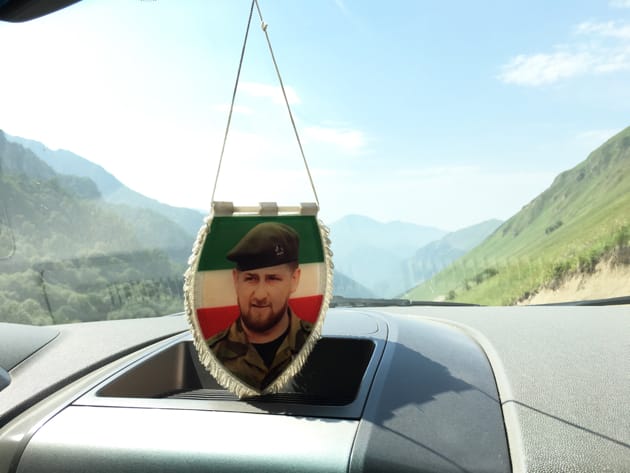 Ramzan Kadyrov took the place of fuzzy dice in one of our transports in Chechnya. PHOTO: KENT RUSSELL
Ramzan Kadyrov took the place of fuzzy dice in one of our transports in Chechnya. PHOTO: KENT RUSSELL
Unbeknownst to the group, Inna had been reaching out to Ramzan via his infamous Instagram account. Kadyrov’s cult of personality thrives on social media, where he’s posted many well-liked pictures and video clips of himself praying, himself hanging with Gérard Depardieu and Elizabeth Hurley, himself wrestling crocodiles, himself starring in the trailer for an action film entitled “Whoever Doesn’t Understand Will Get It.” Despite having more Instagram followers than subjects in his republic, Ramzan decided to “follow” Inna back. Now, she could converse with him directly. In the Kadyrov museum, Inna apprised Shane of this development and asked what she should write. “‘Hello Mr. President,’” Shane suggested, “‘we are a group of foreigners from different nationalities that would love to meet you and discuss travel and tourism in your beautiful country.’” Those of us who overheard this back-and-forth craned our necks to get a look at Inna’s phone, snickering deliriously.
Later, the Mohammeds walked us to an overlit marble-and-gold party hall where veiled women were hurriedly stitching roses into sculptural arrangements. Tomorrow is Ramzan’s mother’s birthday, Mohammed #1 told us. This is special surprise for you, to see.
Shane checked behind the bar—mixers only. Inna and the Gabriella-Chandra dyad took selfies on the bedazzled stage. I walked between set tables to the place of honor. I turned to Mohammed #2 and said, “Aren’t they worried about security or anything? I mean, if I was an assassin, I could poison Ramzan’s glass here.”
“No, no,” Mohammed #2 assured me, “nobody here would try to kill Kadyrov. All the extremists, they went to the jihad, so they’re not here.”
“Are we invited to the party?” Shane inquired.
“We will see,” Mohammed #2 said.
“Can we crash the party?” Shane retried.
“We will see, but no,” Mohammed #2 answered.
“Does nobody else feel icky about this?” I asked. I didn’t mean it rhetorically, but that’s what the question ended up being.
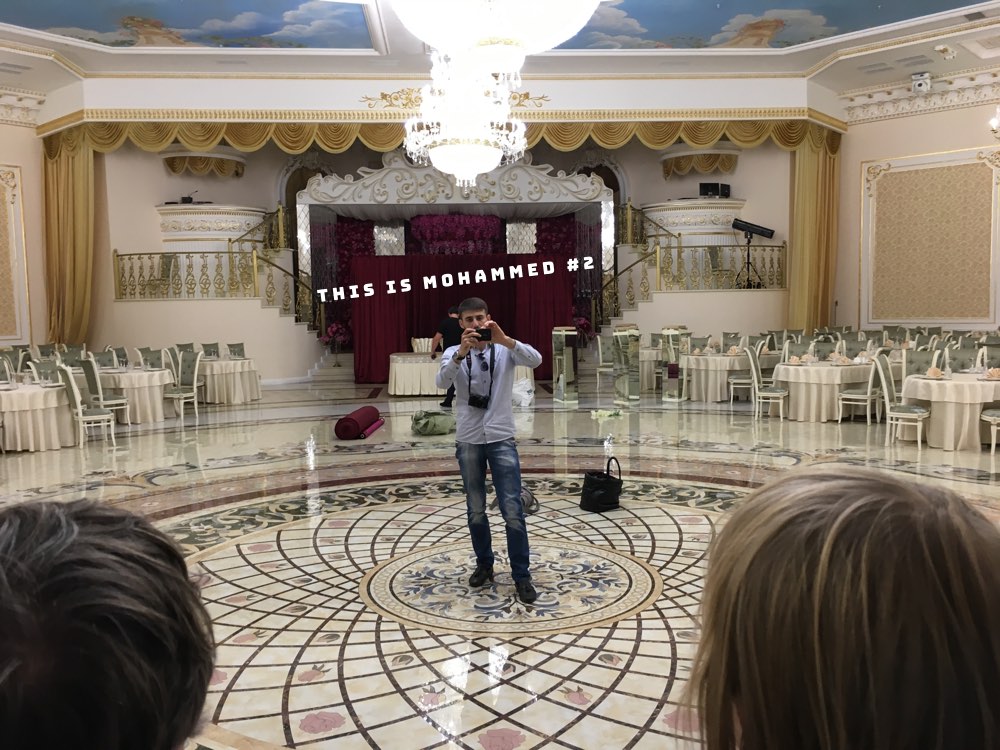 In the ballroom before the big birthday bash for Ramzan’s mom. PHOTO: KENT RUSSELL
In the ballroom before the big birthday bash for Ramzan’s mom. PHOTO: KENT RUSSELL
For the next few days, we crisscrossed the republic in our minibus, taking in what few sites Chechnya had to offer.
● Firstly, the liquor store. Or, once we learned that Chechnya has no liquor stores, the one Western-style supermarket in town where a person is permitted to buy alcohol between the hours of 8 a.m. and 10 a.m.
Most every day at 9:50, our minibus screeched into the parking lot, where we disembarked and did battle with a handful of bleary-eyed Russians over the small supply of booze. This the Chechens kept under guard in a wire cage, which they rattled when yelling things like “THREE MINUTES TO GO, ДАВАЙ!” while we frantically raked bottles of “Your Choice Whiskey, With Taste of Scotch” into our baskets à la “Supermarket Sweep” contestants.
● We visited many a cluster of ancient stone towers, the narrow, pointed fortifications in which every Chechen family used to live. “Seen one, seen 'em all,” Shane decreed.
As our minibus descended switchbacks after one such excursion, Inna received a reply from Ramzan. He wanted to know what we were doing later.
● One day, we clambered up wet and insanely treacherous rocks in order to dip our tootsies in the pool beneath a tall and prismatic waterfall. “Mohammed,” I said to #2 while pinioning my arms, trying to keep my center of gravity beneath me. “Do Chechens have anything like the legal concept of liability?” Around us, children ran across wet stones at a full sprint. Grandmothers skipped from foot to foot with a baby curled to each shoulder. After giving my question some thought, Mohammed #2 said: “No. We don’t have this. If you break your leg, you have broken your leg.”
● Late in the week, we crashed a Chechen wedding where: a) There was no drinking, naturally. (“Because then the men would fight the men”—Mohammed #2.) And yet: b) The guests still managed to dance feverishly, unselfconsciously.
Imagine a sped-up sea chanty set to double bass drums, and then transliterated into Lite Brite—that’s Chechen wedding music. Now imagine a baroque heel-toe jig combined with a lot of bent elbows and flouncing karate chops, all performed while moving quickly in a circle with a pistol tucked into your waistband—that’s Chechen wedding dancing. The groom’s family begged us to give it a try, but we’d left our alcohol on the bus, so we watched from the safety of the balcony.
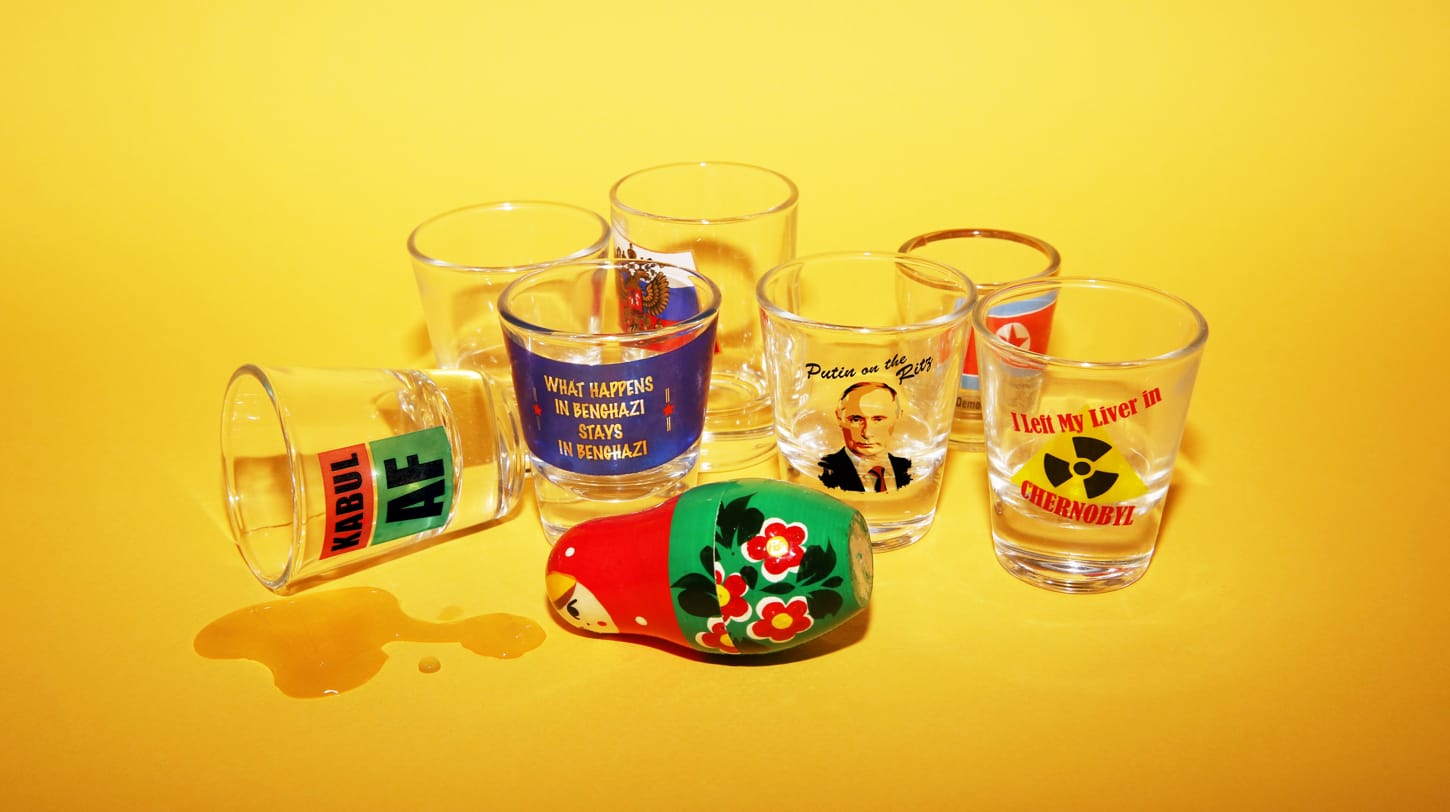
It’s useful, if you’re a tour company, to keep everyone good and loaded. Drunk people are less likely to nitpick, more apt to overlook things. That, and a group of drinkers builds complicity through mutual embarrassment. For instance, the jokes at the bar about Hey, Kent, you definitely shit your pants on the train, right??—and then my being like, Ha, yeah, sure, I shit my pants on the train, and I’ve been wearing them practically every day since, with shit in them, ha!—this really brought us together.
Honestly, the group needed booze to butterfly their tongues. Without it, my fellow Young Pioneers tended to sit back and watch in silence as my or Shane’s attempts at engagement thudded to ground like unheeded flares. The most excited I ever saw them get was when they were told they’d be able to send postmarked postcards from South Ossetia. Give them alcohol, though, and the travel tales flowed. They would balk at the comparison, yet there was little difference between these adventure travelers on two chardonnays and elderly cruisers seated around the dining table, kvetching and talking shop in turn.
One evening, while we were waiting outside our hotel for a taxi to whisk us to our nightly drinking session at the capital’s lone bar, a dome atop the “five-star” Grozny City Hotel, a nondescript sedan pulled up to us. Out stepped a stocky man in damp gym clothes. He strode to Inna and explained that he was the head of the secretariat of the Chechen Republic. Effectively, he was the president’s aide-de-camp. Ramzan had dispatched him to see what our deal was.
He, Inna and Mohammed #1 sat down on a bench; the rest of us crowded around. Inna and Mohammed gave Ramzan’s right-hand man the rundown: where we’d been, how beautiful and peaceful and not at all totalitarian we thought Chechnya was. The functionary nodded, his eyes fixed on his phone as he scrolled through Instagram.
Men came out of the hotel to pay their respects. Mohammed #1 sat there swallowing hard, and frequently. Inna asked again if we could meet with Ramzan. The functionary said he’d see what he could do.
Then he burst out laughing. He lowered his chin to his chest. He slapped his knee. We Young Pioneers looked to one another, widening our eyes and practically tugging at our collars.
He held up his phone and played an Instagram video. It was... a propeller plane rumbling down a Chechen street... getting a few inches off the ground... and then slamming directly into a parked car.
It happened not far from where you were today! he told us. Did you expect to see things like this in Chechnya? His smile disappeared. What did you expect to see in Chechnya?
We bit our tongues. We chuckled nervously. No one ventured much.
Well, he said. Let’s take a picture.
I put my hands up. I was ready.
Take me to the torture palace.
Every single one of us passed our phones to the assigned hotel employee. Group shots done with, we took selfies. I stood behind the right-hand man’s shoulder. I smiled widely. Turned out, my fly was down. If he smelled the Your Choice on my breath, he didn’t say anything.
Afterward, we tried to hash out the potential ethical quandary of ’Gramming these photos. Chandra said, “I’d keep the photo, but I wouldn’t post it.” Gabriella responded, “You wouldn’t? I definitely would.” Some others agreed. Their rationale was that the head of the secretariat—or, dream of dreams, Ramzan himself—made for quite the trophy to pose next to. Not unlike a lion bagged on safari. Here w/ one of cruelest and most dangerous beings on the planet 😂😂. Who would ever top that?
Especially now, when half of one’s Facebook or Insta feed is given over to the unspoken brinkmanship of friends trying to outdo friends with photos geotagged in Skopje (terrible, what tourism has done to the Old City there…), or Patagonia (pff, you got your copy of Bruce Chatwin in your back pocket, bro?), or Machu Picchu (oh, honey). The bar for the most audaciously enviable (yet also relatable!) shot—it keeps jumping higher. I mean, what’s a guy gotta do to get you, the person on the other side of the screen, to take a break from your unleavenably ordinary day in order to admire and begrudge my adventuresome existence??
Paramount to this discussion—yet somehow also lost in it—was the fact that we were snapping these photos in a land subjugated by an autocrat, and we were doing so more or less on that autocrat’s terms. Ramzan Kadyrov condones honor killings, encourages the torture of gays and disappears dissidents. His Instagram is gauche and hilarious, sure; but actually being here, abiding by his rules in his domain, proved we were more comfortable with his “kitschy” tyranny than perhaps we would care to admit. Me and the other YPTers here (as well as the ones in Iran, North Korea, Turkmenistan, et al.)—we were putting a normalizing duckface on jackbooted killers.
That being said, please believe we still went out drinking.
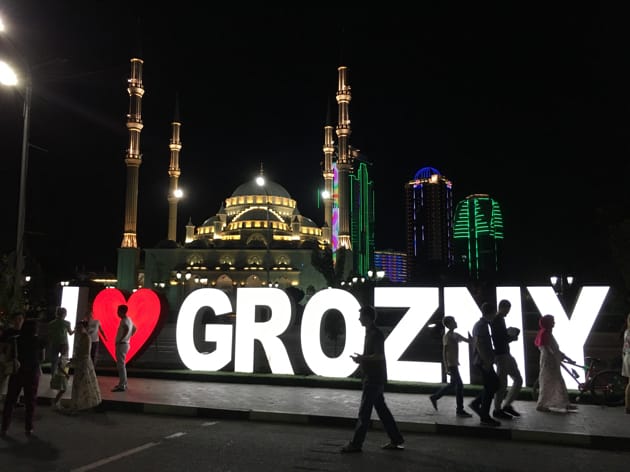 Don't we all. PHOTO: KENT RUSSELL
Don't we all. PHOTO: KENT RUSSELL
When we returned to the hotel, our phones were able to draw deeply of the Wi-Fi. They chimed with the same alarming notification: Trump Threatens ‘Fire and Fury’ Against North Korea If It Endangers U.S.
We retreated to the fifth floor’s dark balcony, where we dangled drinks over a flimsy railing. A few hundred yards away, construction cranes slept beside modest high-rises-to-be.
“Oi, slag—so your man Trump, eh?” was how Shane opened the conversation.
Matilda said, “I would so love to put a world map to Trump…”
George agreed, “Yeah, give it to him upside-down. It won’t make any difference.”
“Yes,” I countered, “but isn’t it kind of ridiculous that the world is on the brink of blowing up partly because somebody may have done a dumb thing on one of these trips?”
Everyone aimed their eyes at the intersection below.
“Did any of you know Otto?” I asked.
In unison, a quick no.
“With North Korea, it’s all clickbait,” Shane declaimed. “They can say what they want, they can report what they want, and people will read it.”
“And people will believe what they want to believe,” George agreed.
“Let me tell you how it looked to some across the pond,” I said. Then I explained: A shockingly large segment of the American populace took North Korea at its word regarding Otto’s detention. Based solely on evidence provided by a murderous regime, they believed that Otto, a Jew active in his campus Hillel, “admitted” that he stole a propaganda poster for a church contest.
Why some people believed this, I wasn’t sure. Maybe they saw something resembling accountability, at last. A young, upper-middle-class white kid—the kind who regularly gets acquitted of crimes because of “affluenza" or boys-will-be-boys apologism—was finally subjected to the same harsh standard as the rest of the world. As to whether he had anything to be held accountable for—well…
I queued up some headlines on my phone for them. HuffPost: “North Korea Proves Your White Male Privilege Is Not Universal.” USA Today: “UD Professor says Otto Warmbier got ‘what he deserved.’”
“Bloody hell,” George remarked.
“I get it, though,” I continued. Guys like Otto and me can go to North Korea, Chechnya, the corner store at 3 a.m. and not once have fear flood our minds. Women, people of color, gay or transgender individuals—some of these people would never dream of going to such places. They could never dream it. Which, at bottom, means travel like this is unfair in that I get to move about untethered from the reality of the world as it is experienced by the vast majority of that world. I get to escape my daily life by finding new, unique daily lives to impinge upon.
“Anyway, it probably didn’t help that you guys called North Korea ‘extremely safe’ on your website,” I concluded, starting to fully feel the effects of Your Choice.
“Look,” Shane said. “We know about as much as everybody else knows. But there’s no history of them arbitrarily detaining American citizens. It doesn’t happen. There’s nothing in it for them to do that.”
“I was more afraid in Baltimore than when I was in North Korea,” Matilda offered.
“We got nothing but support from the other tour agencies,” Shane said. “Nothing but support from people going ‘You’ve handled it well,’ or ‘Good luck.’ Because they’ve all had tours where things have gone wrong.”
“Sure,” I said, “but didn’t I read that you guys have some kind of rite of passage where you run down the forbidden floor in your North Korean hotel?”
“That floor is an open secret, yes,” Shane said. “But we never encourage people to go there because then we’d lose our jobs.”
George asked, “He died on American territory, didn’t he? Now, in the U.K., you wouldn’t get a situation where you couldn’t have a proper autopsy, because it would happen automatically. So I don’t quite understand how that would happen in the States.”
Jin, who had been sitting quietly in a corner of the balcony, cleared his throat and said: “You don’t even have to autopsy to find out what happened. You could do any number of brain scans.”
“What do you think, Jin?” I asked. “In your mind, what happened?”
“I have no idea,” he said. “He may have sustained his injury maybe a month or three weeks before he was released.”
“Or more?” Shane said. “Because they were saying he was in a coma for a year.”
“I don’t buy that,” Jin answered. “I don’t believe the North Koreans would do that.”
“What do you think about self-harm?” Shane asked.
“It’s a possibility,” Jin said. “I can’t discount it. But, um, I would assume that American citizens are treated moderately well. They’re worked hard, but, you know, you wouldn’t be without food, you wouldn’t be without water, you wouldn’t be without the basic necessities.”
“You’re probably in better condition than other detainees…” George added.
“We’re still going to take Yanks to North Korea if they’ve got a dual passport,” Shane said. “It’s not like the State Department would know either way, since they don’t stamp your passport…”
I could no longer drink in this discourse. I slipped off to bed.

As was the case practically every morning on my tour, I rose with the sun feeling fresh-cracked. Peering through the gauzy sheet tucked over my head, I thought I could detect my duffel thudding “Tell-Tale Heart”-style across the baseboard, on account of the bagged abomination inside. If I wanted to get rid of my shitty drawers, now was the time—Jin was still asleep, and we weren’t due to meet in the lobby till 9 a.m.
I had been dreaming of this moment for more than a week. Rare were the occasions when I wasn’t surrounded by YPTers. Tense were the days we drove around the republic, getting stopped at checkpoints by teen sticklers with guns. Every time, I saw it playing out: An ambitious young militsiyoner rifles through my bag; he finds a dense brick of something suspicious, hermetically wrapped; he calls out to his superior, to ensure he gets full credit for the find; the whole company gathers round; they lean in; the calm militsiyoner returns to the bus with my mudpants flying atop his bayonet, with a few questions for the group.
I walked along weedy broken sidewalk past shuttered storefronts and exactly zero garbage cans or dumpsters (due to terror concerns). Already the day had been cinched with heat. In time, I found a bench along Putin Avenue with an overflowing garbage bin next to it. It would have to do. So as not to seem like I was planting a bomb, I sat down for a few minutes. While stretched on the bench, I happened to espy Ruud. He was sneaking out of a shawarma joint, his shirt soaked through with meatsweat. I started and then could not stop giggling. I was deep into my adventure, and I had yet to leave that punchy, dreamlike, hungover state in which everything appears absurd and miraculous and causes one to laugh purely, like a child. YPT prefers it this way, I couldn’t help but think.



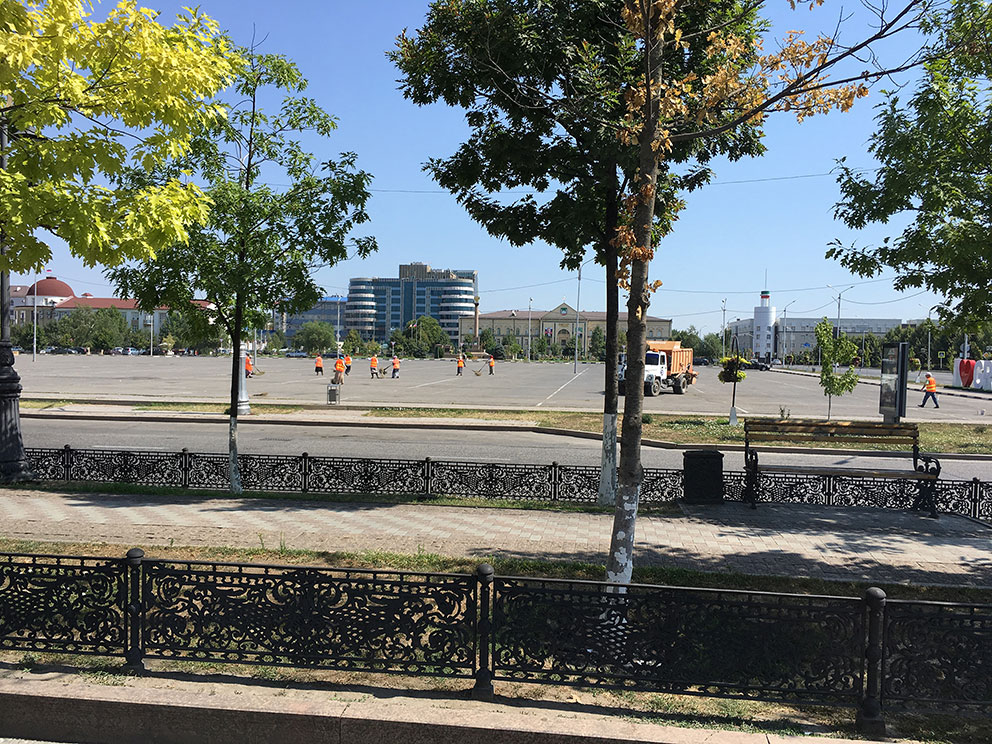
Aside from my laughter, it was very, very quiet there. Through traffic was barred on Putin Avenue during weekends, so I was able to hear the hammer and rasp of a construction crew in the distance. A few cliques of women in full veil hurried past. I recalled Roger Scruton’s description of the traditional Islamic city: walled houses, jumbled courtyards, and very few public places outside the mosque and souk; “a creation of the shari’a—a hive of private spaces, built cell on cell.” A boulevardier like myself was an anomaly, then. I certainly felt eyes on me.
I didn’t swivel my head, didn’t want to appear suspicious. I just punched my plastic bags deep into the bin. I walked away with my hands in my pockets and a whistle on my lips. That’s when I noticed men emerging from alleys and shop entrances. They were looking my way. I picked up my pace. The men started to shout.
Black-clad militia types poured from a cross street and trotted toward me. I considered running. But running would make it worse, I figured. So I stopped.
Welp, I thought. In the end, it’s even dumber, somehow, than getting accused of stealing a poster. I could see the crawler: “Russia relations strained after American detained, suspected of planting fertilizer bomb.”
For a few seconds, I was irate at YPT. They didn’t expressly encourage stupid behavior, no, but they didn’t discourage it, either. They cultivated an environment in which loathsome things could arise and flourish. Then they disclaimed all liability in the fine print: “We have no responsibility in whole or part and customer agrees we are not liable for any and all liability or claims for any occurrences including but not limited to any delay, loss, accidents, personal injury, political unrest, sickness, medical expenses or property damage occurring on tour.”
You can lead a bro to sociopolitical flashpoints, the company philosophy goes, but you can’t make him stop drinking before he triggers an international incident.
Surely, I thought as the men closed in, this outfit should be shut down. For Christ’s sake, why even give jabronis such as myself the opportunity? At this moment, I could not have agreed more with Pascal: “The sole cause of man's unhappiness is that he does not know how to stay quietly in his room.”
I had always assumed that my fast and loose traveling would lead to, in the worst case, my getting kidnapped or organ-snatched or hit by a bus—something along those lines. No harm (except to my family and a few friends), no foul (except to my family and a few friends). But I saw now that that was a startlingly naive belief, and possibly a destructive one. Who knew how my detention would affect our Russia policy? Fuck, what will the president tweet?
Asserting one’s ambitions and appetites without regard to the whole—that is never not wrong. Confusing one’s self with the outside world—that is the wellspring of what we used to call sin.
The men approached. I put my hands up. I am ready, I said to myself. Take me to the torture palace.
But the men trotted past me. I wheeled around and saw that they were moving to intercept the first black person I’d seen in Chechnya, a burly guy jogging my way. The guards reached for him, but he juked through their grasp. He made it to the head of the avenue, where a squad of blackshirts had formed a human barrier. They stopped him, they pointed to the bare flesh below the hem of his shorts. They wagged their fingers. They beckoned him to come with. He, jogging in place, flipped double birds, shouted “LEAVE ME ALONE!” in accented English. Then he ran as fast as he could in the other direction.
The militiamen cracked up. I finally exhaled. Then I resumed laughing.


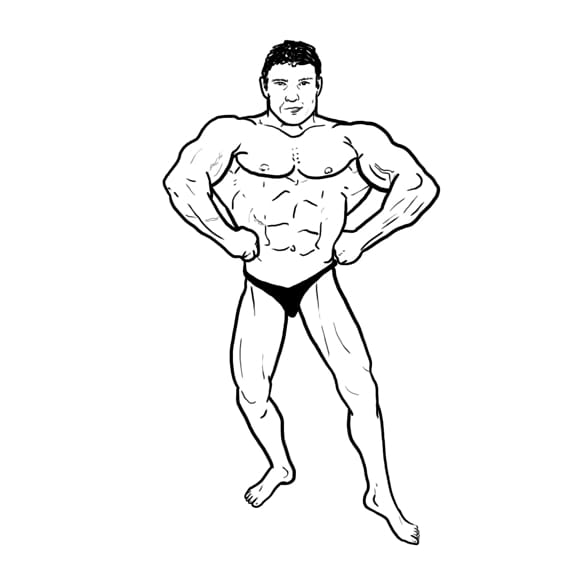
“This beach is much better than the beach in Azerbaijan,” Matilda opined to no one in particular. “There, there is a lot of oil from the refineries in Baku.”
We had exhausted the tourist offerings in Grozny and beyond, so the Mohammeds took us across the border to Derbent in relatively liberal Dagestan, to swim in the Caspian Sea. We spread our hotel towels on the coarse-grit semolina sand that fronted apartment blocks hung with drying laundry. Ruud asked Jin to take his picture while he held an enormous beer in the slate wavewash. Everyone but George stripped down and ran into the water, where half of us were felled by unseen boulders in the surf’s trough. Bleeding from our shins, we frolicked until our beers ran dry, whereupon we returned to the towels.
We asked the Mohammeds if, now that we were out of Chechnya, they wouldn’t like to sneak a drink. “Ehhhh,” Mohammed #1 began. After hard wars, you need hard discipline. Chechnya is rebuilt today because the people are disciplined.
Inna’s phone buzzed with a message. We waited to see if it was an invitation from Ramzan, but it was only YPT’s guide in South Ossetia. “He says that it’s an honor to get guests drunk,” Inna relayed. A loud cheer went up. Buoyed, we drew ourselves into a circle and began to talk current events and politics with the Mohammeds. My tripmates had a stronger grip on the stuff than most Americans, since they were world citizens who had to plan for and react to our temperamental nation’s mood swings like a partner in a codependent relationship. Mohammed #1 told us that Obama was the greatest-ever American president, though Bernie Sanders could have beaten him out. Mohammed #2 said he’s fine with Chechnya being part of Russia. “Somebody else would come along and conquer us,” he conceded. “We are free here to do what we want.”
Too many beats later, Ruud dropped in with: “I think George W. Bush was a better president than Obama.”
As was her wont, Chandra posed a question as a demand: “Maybe you can tell us what you think about what’s happening to Chechnya’s gay population?”
Mohammed #2 began then aborted a few thoughts about Ramzan’s purge. Diplomatically, he offered, “In the West they say this, but here we never hear about it until they say it in the West.” He allowed that there could be as many as two or three homosexuals in Chechnya. “Be gay!” he encouraged these hypothetical gays. “Be gay for yourself! But don't speak about it.”
We had to cancel one of our two scheduled homestays after receiving word that our hostess had fallen out of a tree.
Around us, vacationing Russians were lying on their elbows, paying no mind to the cigarette butts and broken glass studding the sand they were gathering to their torsos. A top-heavy Dagestani bodybuilder in too-small briefs approached us and asked, “Where are you from?” Before we could respond, he shouted “BICEPS!” and contorted into a full-body flex.
Thanks to the beers, our capacity for trust and even love had expanded exponentially. No longer did anything seem banal or merely habitual. We’d moved from the seats to the stage.
“Are you worried about America, Mohammed?” Jin asked. Mohammed #1 said, I don’t want war. I love America. I think New York is greatest city in the world.
“It is Russia Europeans really fear,” Ruud interjected. “Russia coming into the Baltic states.”
Mohammed #1 didn’t wait for Mohammed #2 to translate. He waved away Ruud’s comment before continuing: If I pray for anything, it’s no war. War is something governments do to people. If people could get together like this—here he gestured at the ebb tide, the quarter-sunk sun—we would see that we are all brothers.
And, sure, this was the platitudinous jog of translator-ese. Whatever irony or innuendo Mohammed #1 might have been trying to connote was sifted out of his speech by the more conservative Mohammed #2. What got fed to the Young Pioneers was processed, purified and easy to swallow, like baby food. Sure.
Cynicism aside, though: This moment was beyond improvement. Mohammed #1’s message was being received and appreciated by every YPTer. We were nodding our heads, squeezing shoulders, practically wiping away single teardrops. Later, I’d talk this moment over with the likes of Jin, George, Shane. We all agreed that it was a highlight, if not the highlight, of the trip—nothing dodgy, just some disparate humans on a beach, face to face, existing for one another as ends in ourselves.
“Chechnya is Chechnya, people are people,” George adjudged this moment. It’s a statement that’s hard to disagree with, once you’ve been to the place. Or, for that matter, once you’ve done any traveling whatsoever.
“Any time you try to understand the world,” Matilda offered, “it can only be a good thing.”
Warm breeze, beery joie, birds beating like hearts across the water, faces suffused with golden light. My feeling of lost wholeness was no longer haunting me. This was one of those authentic moments people scour the globe searching after. Not just an impression of our kind, but an invitation to kindness. Not just a glimpse of who we are, but what we must live up to.
Anyway, Ramzan never got back to us, thank God.

Ten days into our Caucasus Combo tour, it was finally time to attempt the crossing into South Ossetia, a small null spot on the globe that belongs to no country and goes largely unrecognized by the international community.[5] 5. In this corner of the world, there are four such regions that are known colloquially as “frozen conflict zones.” They are: Abkhazia, Transnistria, Artsakh (formerly known as Nagorno-Karabakh) and South Ossetia. Each emerged out of warfare, and to warfare each could easily revert. Shane was visibly petrifying with each passing mile. There was simply no way for him to know if they would let us in, turn us back, detain us—what? “Just remember,” he told us in a kind of pep talk that seemed mostly for his benefit, “we’ve had a great trip even without South Ossetia!”
On the road to the border, he and Inna had us practice our personal statements in preparation for interviews with the Federal Security Service. Since Russia doesn’t allow official observers into South Ossetia, I was absolutely not to mention anything about being a writer. I had put down “college instructor” on my visa application, which was at least partly true.
We wended up the still-fortified highway that invading Russian tanks traversed nearly 10 years prior during a brief, annihilating war against Georgia. In its aftermath, the South Ossetians found themselves with the bummiest of bum hands. Finally free from Georgia after a century of ethnic strife, they were left with little industry, a tiny federal budget footed almost entirely by Moscow and no official status.[6] 6. Russia has postponed formal annexation—and probably will indefinitely—because the ongoing territorial dispute keeps fractured Georgia out of NATO. Meaning South Ossetia is trapped in a state of suspended animation not unlike that of a comatose body kept alive for political purposes. It certainly isn’t being kept alive for anything harvestable—one of post-war Ossetia’s most valuable assets was a cobwebbed mill worth a few grand in scrap.
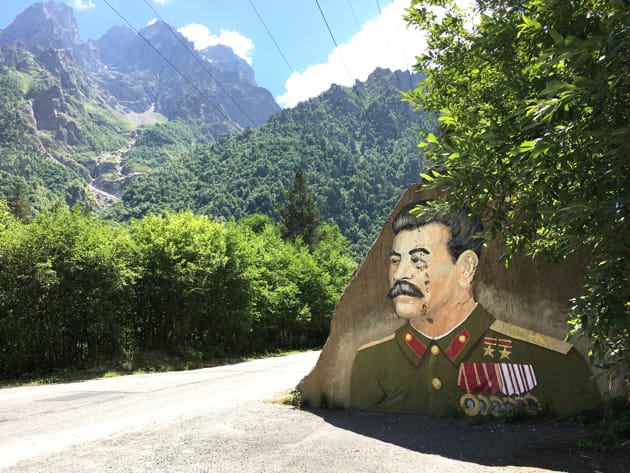 A portrait of Stalin on the highway to South Ossetia. PHOTO: KENT RUSSELL
A portrait of Stalin on the highway to South Ossetia. PHOTO: KENT RUSSELL
We entered one checkpoint, where we recited our alibis in our heads like prayers. We passed through another, where a short-fingered man said nil while pointing at free lines in a ledger for us to sign. In the end, the Russians and Ossetians waved us through without so much as a shoulder tap. In fact, they left it up to us as to whether we wanted a South Ossetian stamp in our passports.
“Oi, we’re the first tour company to go to all four frozen conflict zones!” Shane shouted, as if to proof-test the statement.
“Yes, I know, I have done them all,” Ruud deadpanned. George and Jin said they now had, too.
We were met on the other side by our handlers—Eka, a tall 20-something who’d studied in Richmond, Virginia, as a high school foreign-exchange student; and Giorgi, a squat and darkly handsome man who was the current president’s nephew (as well as the previous president’s nephew). They drove us in two cars past heavy guns pointed south toward Georgia.
South Ossetia felt haunted in a post-apocalyptic sense—life here had been extinguished suddenly, yet clues to its past remained. We traveled through 1,500 square miles of empty mountains, emptier sky, stray dogs, broken churches, decayed Soviet infrastructure and burned-out husks that were once Georgian villages. The inhabited villages weren’t much better off; the biggest difference was the woodsmoke wafting out of shanties.
“Hard to tell whether something in this country was devastated by time or war,” Shane said.
“Interesting theory,” George proposed. “War is just time accelerated.” Then he laughed.
None of the aforementioned sights were we able to explore on our own. Our being here was contingent upon our seeing what the South Ossetian government wanted us to see—and only what they wanted us to see. For instance: Not far from the road we traveled, Russian forces were in the process of “border demarcation” along the administrative boundary with Georgia. A few weeks before our arrival, these soldiers had picked up border signs and moved them 2,300 feet deeper into Georgia, absorbing a section of the Baku-Supsa oil pipeline overnight. This, we absolutely would not be seeing.
It did not take long for us to reach Tskinval (formerly known as Tskhinvali under the Georgians), which seemed more or less identical to every other provincial post-Soviet capital. That is, until Giorgi drove us to Tskinval’s southernmost limit, which abuts the border with Georgia.
This is first building attacked by Georgians at 11:45 in the night, Eka translated for us, gesturing at a fortified military building. As you can see, it is still Russian base. The Georgians killed 60 peacekeepers here.
On foot, she and Giorgi led us up the Street of Heroes, the still-ruined thoroughfare where South Ossetian irregulars battled Georgian forces block by block. They showed us bullet-nibbled walls, fields of detailed havoc. An older man approached and angrily demanded to know why we were gawking. Giorgi grabbed him by the nape of his neck and led him away while whispering in his ear.
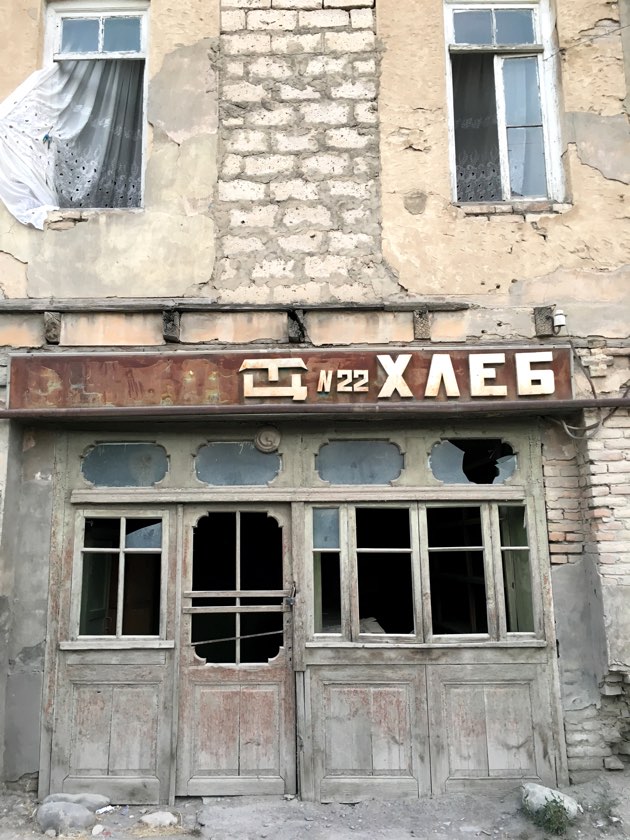 A former bakery near the new parliament building in Tskinval. PHOTO: KENT RUSSELL
A former bakery near the new parliament building in Tskinval. PHOTO: KENT RUSSELL
Let’s be clear: We were engaging in “dark tourism.” We were poking around a “death space,” as specialists term it, a site “where the death of others is commoditized as a tourist product.” Such spaces, Young Pioneer traffics in them.
The allure was that we were death-adjacent yet still relatively safe. And it felt ghoulish and exploitative, yes, at first. Ossetians were gazing down from their apartment windows at a bunch of strangers stumbling through the remains of their worst day. If they were seething at us, I couldn’t blame them. How were we any better than the shameless vultures who went on Hurricane Katrina aftermath tours?
We took pictures in front of buildings cheesed with ordnance holes. I tried to keep in mind that “dark tourism” is a lot older than the selfie stick. Mark Twain toured Pompeii and then wrote about it. Anton Chekhov was the world’s first “gulag tourist.” The inaugural guided tour in England was a day trip, via locomotive, to witness the hanging of two murderers. The very idea of tourism in the West originated with pilgrims’ desire to poke around the empty tomb of a peasant executed by the state.
As if to prove all was not destruction here, Giorgi and Eka showed us the gleaming new parliament building. Just a few hundred yards beyond it, though, were the vestiges of Tskinval’s Armenian and Jewish quarters, where the worst of the fighting took place. We climbed through rubble, we clicked photos on our phones. Shane was pissed that we had arrived just past the golden hour.
One of the problems of “dark tourism” is that it’s an imprecise designation. If being a “dark tourist” means visiting “death spaces,” well, who hasn’t been to a death space? Most of the leading scholarship on the topic suggests that going to any of Hiroshima, the Taj Mahal, or Arlington National Cemetery makes one a dark tourist. Lexington and Concord or a Titanic memorial cruise, too. One could make the argument that many destinations within the continental United States are themselves Native American burial grounds.
Nevertheless, South Ossetia was different from these places in terms of rawness. The woe was still smoldering here. Compare it to an event like September 11, and visiting the Tskinval destruction would be analogous to entering the crater of ground zero before it was built into the 9/11 Memorial. Free of any context or perspective for outsiders. We were but the first pips of the coming encrustation of touristic infrastructure. At least Eka and Giorgi hoped so, for their economy’s sake.
We walked past a carbonized bakery, stopping to photograph the sign’s extant word, хлеб, or “bread.” At the other side of the road stood a weathered poster promising: Ossetians will never forget the genocide!
I can’t comment on how my fellow travelers were reacting. They were silent as ever while exploring the ruins. Did that mean they were solemn? Bored? Psychosexually exhilarated by the pure, un-stepped-on misery? I don’t know.
“Please look at this living house,” Eka said. “This is new. The old one was completely destroyed. The Georgians, they shot at civilians and also civilian things.”
If you asked me, this was the opposite of escapism. Brushing up against death and coming away unscathed was one of the few ways left in a desacralized world to achieve something akin to ontological security: I am here now. I am alive.
But just because I’m free to seek security at the expense of other beings doesn’t mean I should. In visiting far-flung places like this one, I was bringing not innocence into them, but something much darker: tourism. That symptom of the sickness we suffer from, aka “existentialism,” that impels locals to sterilize and commodify their history, their pain, their cultural heritage until they, too, are rich enough and anomic enough to seek out something other somewhere else.
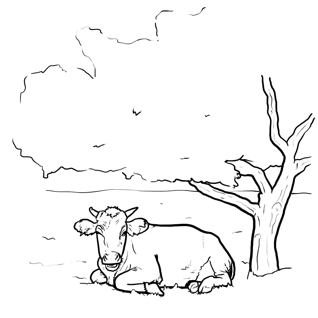
Inna had to cancel one of our two scheduled homestays after receiving word that our hostess had fallen out of a tree. Still, though, we’d get our chance to spend a night at a real South Ossetian farmhouse. To get there, we traveled for several hours along a gravel lifeline deep in the cupped hands of the mountains. Giorgi laughed at our panic whenever his vehicle—which still had its price grease-painted on the windshield—slammed into and scraped over boulders along the path’s unguarded bends. And because there was no potable still water in South Ossetia (outside the bottom shelf of one shop in Tskinval, where the labels read “Water for Babies,” to give you an idea), Giorgi occasionally stopped at rusted spigots tapped into the mountains so we could load up on icy mineral water laden with beneficial heavy metals like silver.
A velvet darkness had come down by the time we reached the three-room dwelling. There, a recent widow lived alone with a handful of cows and some hives of bees. Inside, a century-old stove warded off the Caucasus chill.
The widow was bundled in kerchiefs and aprons. She spoke only Ossetian. She neither talked to us nor asked of us anything. She left us free to roam her property, inspect her outhouse, play with her accordion, adjust the pictures on her wall. Meantime, she busied herself with the preparation of a traditional Ossetian feast.
Here, in microcosm, were all the joys and complications of this kind of travel. We were imposing upon a peasant woman, we enormous foreigners, cracking beers, filming her as she milked her cows, waiting to be fed with more food than she might eat in a month. But, then again, we were paying her more money for one night’s work than she was likely to get from a whole lot of subsistence farming in a mountain range in an unrecognized country.
Should her first contact with Westerners have been, I don’t know, a cohort of Rhodes scholars, or folklorists, or just kind, sober people? Probably! Did we nonetheless approach her with respect, curiosity and genuine goodwill? I like to think so.
At least until Giorgi brought out the chacha. He decanted this homebrewed vine vodka into an assortment of distressingly wide glasses. We gathered round him and his flowerpot of alcohol at a table piled high with fresh-baked flatbread, garden vegetables and about a dozen Ossetian pies—beef pies, cheese pies, beetroot pies. Joining us was a warm if silent man named Vadim, slightly brooding in aspect. Vadim, we were told, was a veteran of the war with Georgia as well as South Ossetia’s minister of tourism.
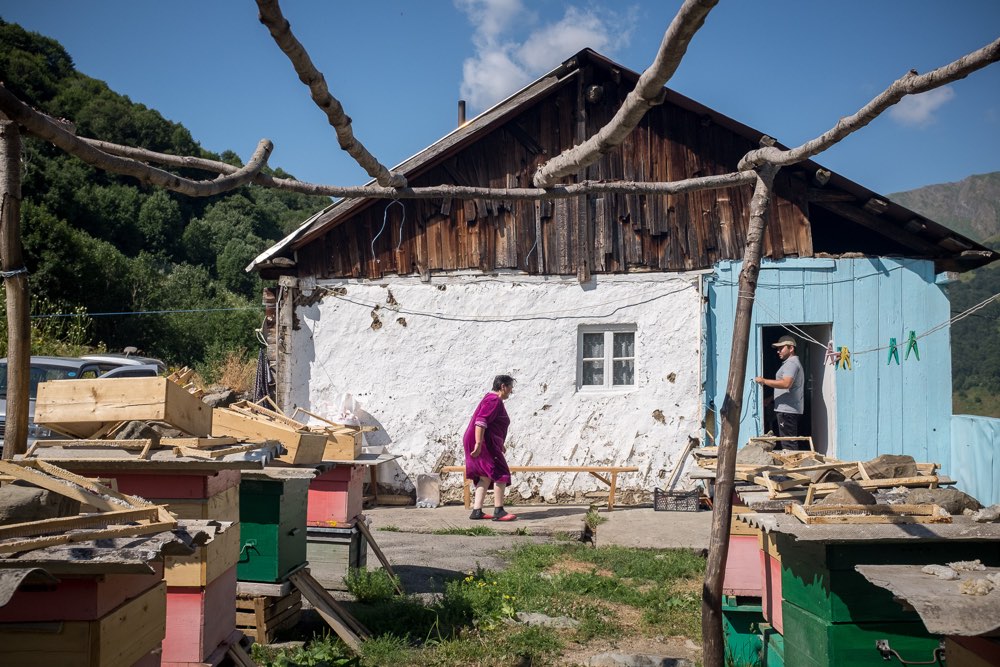 Our hostess stands in front of the home where we stayed in South Ossetia. PHOTO: SHANE HORAN
Our hostess stands in front of the home where we stayed in South Ossetia. PHOTO: SHANE HORAN
Despite that, Vadim deferred to Giorgi, who stood at the head of the table and proposed his first toast. Something about friendship, and understanding—I’m not really sure because Giorgi moved on quickly to his second toast. Then his third. The slugs of chacha went down like glowing bolts of metal pulled from a forge. Slowly it dawned on me that, should any of us poison ourselves with alcohol, the cow pasture would be our final destination.
It is your turn now to propose toasts, Giorgi told us through Eka. Honest toasts, from the heart. He led the way with a stirring tribute to South Ossetia’s war dead. Ruud, God love him, was hunched over the vegetables, jabbing with his fork. “I don’t want to play this game,” he said through a full mouth. One by one Matilda, Gabriella and Chandra saluted hospitality, world peace and hospitality again.
The chacha had soused me something good. I was feeling the irrigating pangs of conscience. When it was my turn, I raised my glass and looked around the table, making deliberate eye contact with those I’d come to consider friends. I understood then that YPT’s five-star scores came from people who weren’t rating the company, per se, but who were rating their group. Their camaraderie, the time they had together.
I opened my mouth. A flecked burp turned the air to jelly in front of me. I closed my mouth. “Christ, you could clean an oven with that,” Shane joked while fanning the air. I tried to compose myself.
Then, struck by inspiration—and disregarding my own politics, wishing solely to be a good guest—I repeated a bit of graffiti I’d seen the other day in Tskinval: Oдна Осетия вместе с Россией и Путиным. “One Ossetia together with Russia and Putin.”
Giorgi’s thick eyebrows practically flew off his face. He whooped it up, overpraising me with somewhat demeaning indulgences as though I were a newly verbal baby. He told me I put him in mind of Pushkin—what with my aptitude for language as well as my terrifically stupid hairdo. We threw back our chacha.
Again, I knew I had made a regrettable decision. One too many down my hatch, I shoved away from the table, choked back the upsurge and gasped something about needing to visit the outhouse.
Barf carefully deposited behind a beehive, I leaned back, meshed my fingers around the base of my skull and drew deep breaths. Amid the clarity and fire of the night sky was a large, unmoored moon. This inhumanly scaled beauty of firmament and mountain—I’d never encountered a vista quite like this. Seen through my runny eyes, the stars’ winking influence seemed to descend directly from their constellations.
For the past two weeks, as we kicked around a dictator’s personal fiefdom and then authentically experienced man’s inhumanity to man, I’d kept returning to the same questions: Should YPT be a thing? Should I be allowed to do this?
In a more perfect world, perhaps, I wouldn’t need YPT to take me where I can indulge morbid curiosity and allay ontological insecurity. In a more perfect world, I would sit quietly in my room, marveling at the humdrum miracle that is my individual, day-to-day existence. I don’t live in that world, though.
I don’t know that many people do. It’ll be in some strange estate beyond this one, perhaps, when we manage at last to have and to enjoy. But all across this world, I’ve found that something in my bloodshot nature makes it so I best enjoy a thing as mine when I’m reminded that, any moment now, it might not be.
Back in the shanty, pandemonium had erupted. Ruud was tottering very near to the red-hot stove after having booted himself. Jin had his arms around the Gabriella-Chandra dyad, who were laughing and agog. George was a shambles, his forehead on the tabletop. Inna and Matilda had atomized into a cloud of revulsion, I’m pretty sure. Preparing a bed for herself on the floor was our hostess.
From our group, only Jin would be staying on for the gulag portion of the Summer Soviet. The rest were heading home, regressing to the mean of workaday-ness: empty offices and single-occupancy flats. There, they would dream up and save for that next trip, the contrails of their departing and arriving flights coiling tighter around the globe as they hunted down the last of its endangered difference.
I sat down next to Shane. “Do people ever just pay as they go?” I asked. “Keep on keeping on with the trips?”
“Aye,” he said. He slapped my back. “We could make room for you on the gulag leg.”
“Nah,” I said. “I gotta get home. If I kept going, I’m pretty sure I’d die.”

